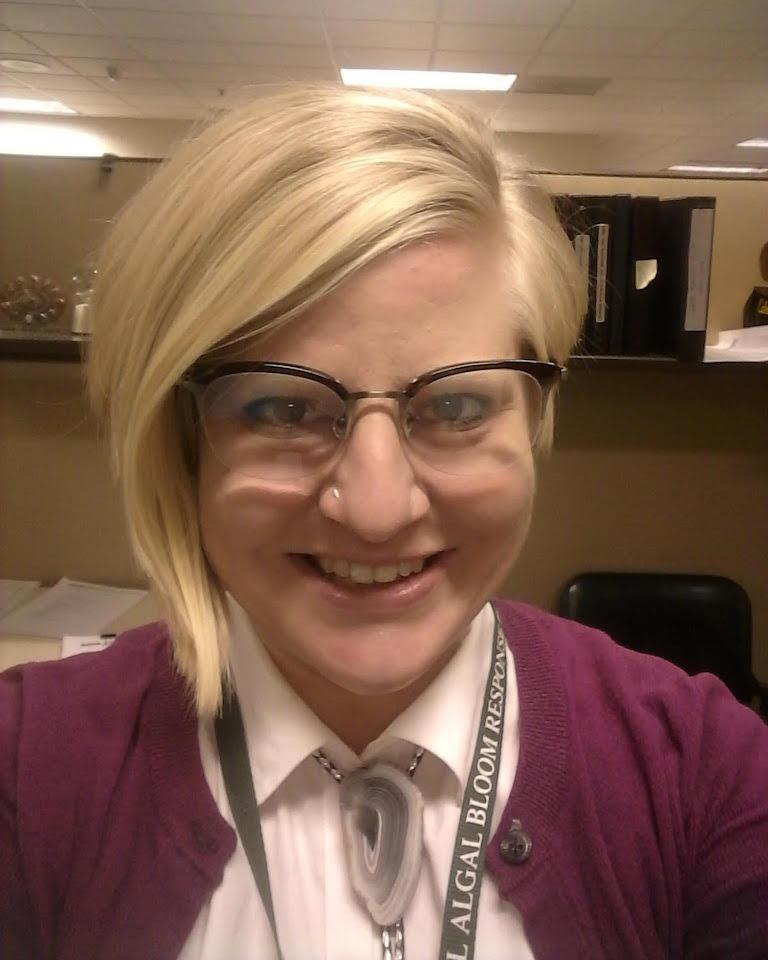Megan Maksimowicz

Winter 2021/2022 Alumni Spotlight
KU Major: Atmospheric Science
Graduation Year: 2009
Current Occupation: Water Quality Standards Coordinator
List the faculty member, staff, graduate student, or postdoc who mentored your research or creative project: Nate Brunsell
Describe the undergraduate research/creative experience that you had while at KU: While at KU I worked with some data from eddy covariance towers placed at the Kanza Prairie. I learned how to program with R, and how to make a scientific poster. I was able to present my project at the Undergraduate Research Symposium as well as the American Geophysical Union Spring Meeting.
Questions:
Q: What did your research or creative project look like on a day-to-day basis? What did you spend most of your time doing?
A: I spent most of my time figuring out how to program! Learning how to look at data and how to approach analysis, and then figuring out how to make that analysis happen in a computer language - it's a steep learning curve. I found that having guidance while diving into a project was an effective way to learn.
Q: What do you think was the most important thing you learned while doing undergraduate research?
A: Attending college as an undergrad is different from attending as a graduate student. I really appreciated having a taste of what graduate life would be like before fully committing. Learning how to build a research problem, how to program, and how to present findings were all lessons that helped me during graduate school. I've continued to build on those lessons and use them in my day-to-day job.
Q: What advice do you have for undergraduates who might be interested in doing research or creative scholarship?
A: It's a rare opportunity in the work world to be able to find any project you want and to just have fun with it. You're not necessarily expected to come up with exciting results, and you'll be able to get out of it what you put into it. So don't stress too much about where your project is going- no matter what, you'll gain some skills along the way.
Q: Do you use any of the skills or perspectives gained doing research in your current occupation? How so?
A: I've been able to build on the skills I worked on during this project- especially programming and presenting information. This project also helped me avoid the dreaded "imposter syndrome" that many young researchers get. Being able to go in with little-to-no knowledge on a topic, get some guidance, and then slowly making my way through a project helped me realize that these are just skills that require practice like any other skills.
Q: Many undergraduate researchers are making decisions about what to do after they graduate from KU. Having been in those shoes, what do you know now that you wish you’d known then? Do you have any advice?
A: I was fortunate enough to get some great advice from my program advisor at the time, Dr. David Braatan. He was the one who suggested that I get involved in a research project. He also gave me excellent advice on getting into grad school- it's important to reach out to potential professors and to look for funding availability.
I also think that it's important to take your time if you need it. I wasn't sure what direction I wanted to go for grad school, so I took some time between undergrad and graduate school. I was a Peace Corps Volunteer in Tanzania for two years, and then I went back to work for a little bit at the U.S. Geological Society before deciding on a research path. I'm grateful for these experiences as I think I've found the niche for me!